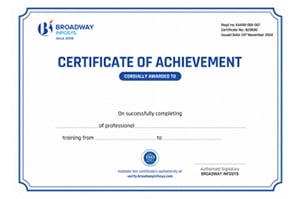Estimation and Costing Training in Nepal
Estimation and costing training is near to inevitable for aspiring civil engineers, drafters, architects, designers, and contractors. Without the idea of how much to implement and demand for all the task that is performed by all the aforementioned, the task-in-hand cannot be completed. In order to ensure that such tasks are completed and performed in the best way possible, Broadway Infosys presents Estimation and Costing Training in Nepal.
As mentioned earlier, professionals with a similar career to that of an architect need to have an in-depth understanding of the costs they need to take or estimate. To achieve success, this ability is bound to be beneficial. So, what are the benefits of taking Estimation and Costing Training in Nepal?
Broadway Infosys has designed the Estimation and Costing Training with the support it provides to professionals, such as engineers. The benefits of taking Estimation and Costing Training at Broadway Infosys are:

Overview of Estimation and Valuation
Types of Estimates
Units and Measurement
Introduction to Valuation
Understanding BOQ
Quantity Calculation
BOQ Preparation
Fundamentals of Rate Analysis
Rate Calculation
Practical Examples
BBS Basics
BBS Preparation
Software Tools
Cost Optimization
Value Engineering
Practical Applications
Running Bills
Preparation
Case Studies
Land Valuation
Building Valuation
Valuation Reports
Material Valuation
Machinery Valuation
Tendering Basics
Tender Documents
eBidding Platforms
Tender Evaluation
Software Overview
Hands-on Training
Add this credential to your LinkedIn profile, resume, or CV to stand out to recruiters.
